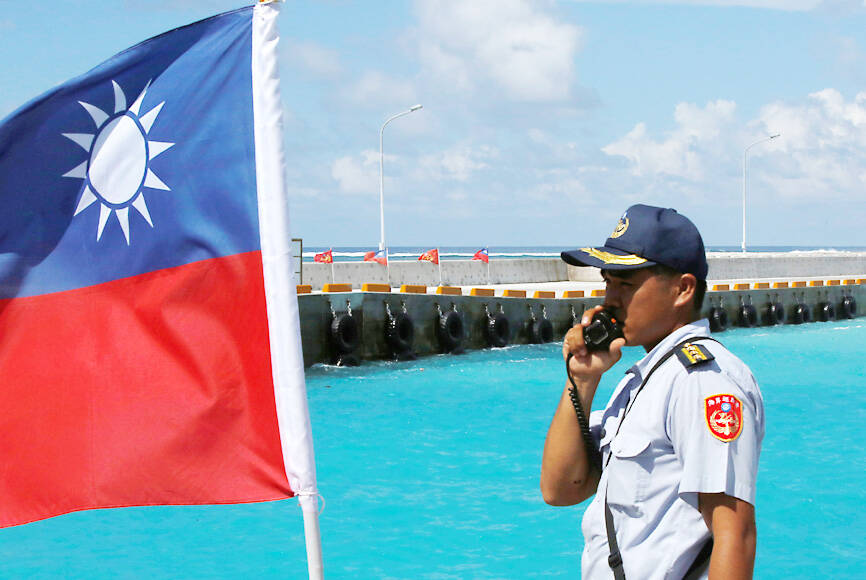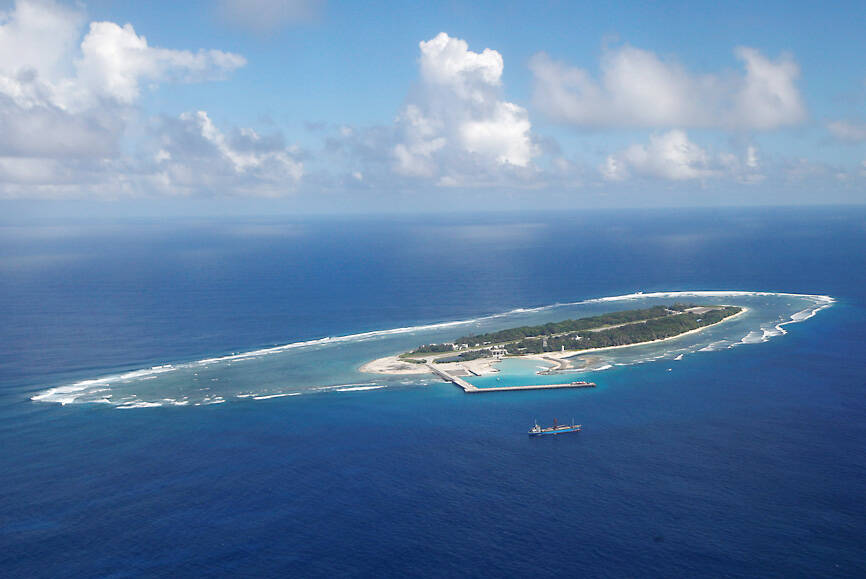The Coast Guard Administration has failed to prevent service members garrisoned on Itu Aba Island (Taiping Island, 太平島) from using a Chinese cellular network to call home in a national security breach, the Taiwan Statebuilding Party said yesterday.
The party received an anonymous tip that coast guard personnel on Itu Aba routinely connected to Chinese cell towers due to poor reception from Taiwanese networks, Taiwan Statebuilding Party Kaohsiung chapter executive Yang Pei-hua (楊佩樺) told a news conference in Taipei.
Using the signal provided by a hostile power is a breach of national security, as China can find the location of devices connected to its networks and intercept communications between them, Yang said.

Photo: J.R Wu, Reuters
Beijing has likely made its 4G network available to local Taiwanese devices to spy on the nation’s service members, she said.
The party went public with the information not to start a blame game, but in the hope that the authorities would be prompted to address the vulnerability and improve cell service on the islet, she said.
In 2018, the National Communications Commission (NCC) praised Chunghwa Telecom (中華電信) for successfully implementing a NT$30 million (US$938,262) project to extend its 4G coverage to Itu Aba after dispatching a mission of senior officials to tour the islet, said Lin Yi-ping (林意評), convener of the party’s Yilan County chapter.

Photo: Fabian Hamacher, Reuters
However, Chunghwa Telecom’s Web site indicated that only 2G services are available on Itu Aba, which does not line up with the pronouncements the commission made five years ago, Lin said.
The use of “enemy cell towers” by Taiwan’s defenders of Itu Aba is a grave security breach that might reduce the nation’s creditability in the eyes of its allies, Taiwan Statebuilding Party Chairman Wang Hsing-huan (王興煥) said.
The authorities must address the problem immediately or the country might as well lease Itu Aba to the US’ armed forces, which certainly would not compromise the security of the South China Sea for a cellphone signal, Wang said.
The Coast Guard Administration and the commission separately said that the islet’s telecommunications satellite coverage was not satisfactory, but added that improvements would be be made soon.
The coast guard said in a statement that safe and secure 4G telecommunications have been available to its bases on the Pratas Islands (Dongsha Islands, 東沙群島) and the Spratlys (Nansha Islands, 南沙群島), including Itu Aba, since the middle of 2017.
A Mitsubishi Electric-made ST2 satellite is the main enabler of 4G phone and Internet services on those islands, it said.
Internet, texting and image-sending speeds are slower for civilian users due to the need to prioritize secure military communications over limited satellite bandwidth, it said.
The coast guard is working with the Ministry of Digital Affairs, the NCC and Chunghwa Telecom to improve telecommunication services at the bases, it added.
NCC Vice Chairman Wong Po-tsung (翁柏宗) said that the ST-2 satellite’s 4G capabilities are mostly used to convey essential military and government communications, leaving limited bandwidth for other users.
This means the network can handle voice calls efficiently, but not much more, Wong said, adding that China is known to operate towers within range of Itu Aba.
The ministry has been working to secure telecom services from OneWeb and Starlink since August last year, he said, adding that a deal could be struck by the end of this year at the earliest.
Itu Aba is too far from Taiwan proper for microwave boosters to be of use, leaving satellites the only viable option for high-speed Internet and phone services, he said.
Beijing operates a large constellation of communications satellites, which gives it a significant edge in the reach and speed of its telecommunications, he said.

CALL FOR SUPPORT: President William Lai called on lawmakers across party lines to ensure the livelihood of Taiwanese and that national security is protected President William Lai (賴清德) yesterday called for bipartisan support for Taiwan’s investment in self-defense capabilities at the christening and launch of two coast guard vessels at CSBC Corp, Taiwan’s (台灣國際造船) shipyard in Kaohsiung. The Taipei (台北) is the fourth and final ship of the Chiayi-class offshore patrol vessels, and the Siraya (西拉雅) is the Coast Guard Administration’s (CGA) first-ever ocean patrol vessel, the government said. The Taipei is the fourth and final ship of the Chiayi-class offshore patrol vessels with a displacement of about 4,000 tonnes, Lai said. This ship class was ordered as a result of former president Tsai Ing-wen’s (蔡英文) 2018

‘SECRETS’: While saying China would not attack during his presidency, Donald Trump declined to say how Washington would respond if Beijing were to take military action US President Donald Trump said that China would not take military action against Taiwan while he is president, as the Chinese leaders “know the consequences.” Trump made the statement during an interview on CBS’ 60 Minutes program that aired on Sunday, a few days after his meeting with Chinese President Xi Jinping (習近平) in South Korea. “He [Xi] has openly said, and his people have openly said at meetings, ‘we would never do anything while President Trump is president,’ because they know the consequences,” Trump said in the interview. However, he repeatedly declined to say exactly how Washington would respond in

WARFARE: All sectors of society should recognize, unite, and collectively resist and condemn Beijing’s cross-border suppression, MAC Minister Chiu Chui-cheng said The number of Taiwanese detained because of legal affairs by Chinese authorities has tripled this year, as Beijing intensified its intimidation and division of Taiwanese by combining lawfare and cognitive warfare, the Mainland Affairs Council (MAC) said yesterday. MAC Minister Chiu Chui-cheng (邱垂正) made the statement in response to questions by Democratic Progressive Party (DPP) Legislator Puma Shen (沈柏洋) about the government’s response to counter Chinese public opinion warfare, lawfare and psychological warfare. Shen said he is also being investigated by China for promoting “Taiwanese independence.” He was referring to a report published on Tuesday last week by China’s state-run Xinhua news agency,

‘ADDITIONAL CONDITION’: Taiwan will work with like-minded countries to protect its right to participate in next year’s meeting, the foreign ministry said The US will “continue to press China for security arrangements and protocols that safeguard all participants when attending APEC meetings in China,” a US Department of State spokesperson said yesterday, after Beijing suggested that members must adhere to its “one China principle” to participate. “The United States insists on the full and equal participation of all APEC member economies — including Taiwan — consistent with APEC’s guidelines, rules and established practice, as affirmed by China in its offer to host in 2026,” the unnamed spokesperson said in response to media queries about China putting a “one China” principle condition on Taiwan’s